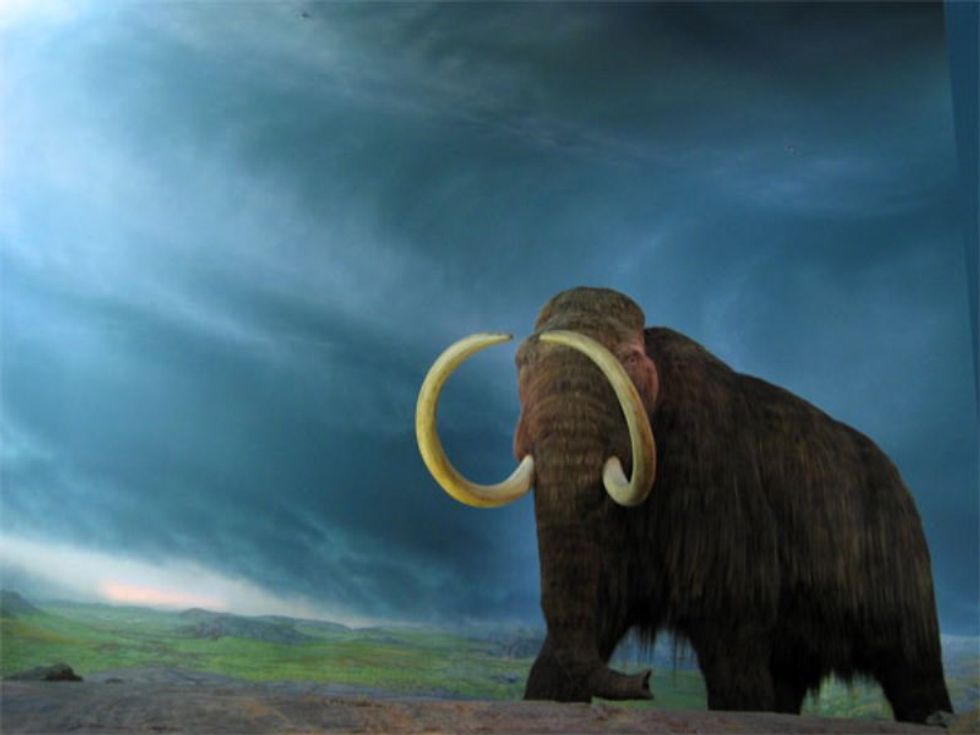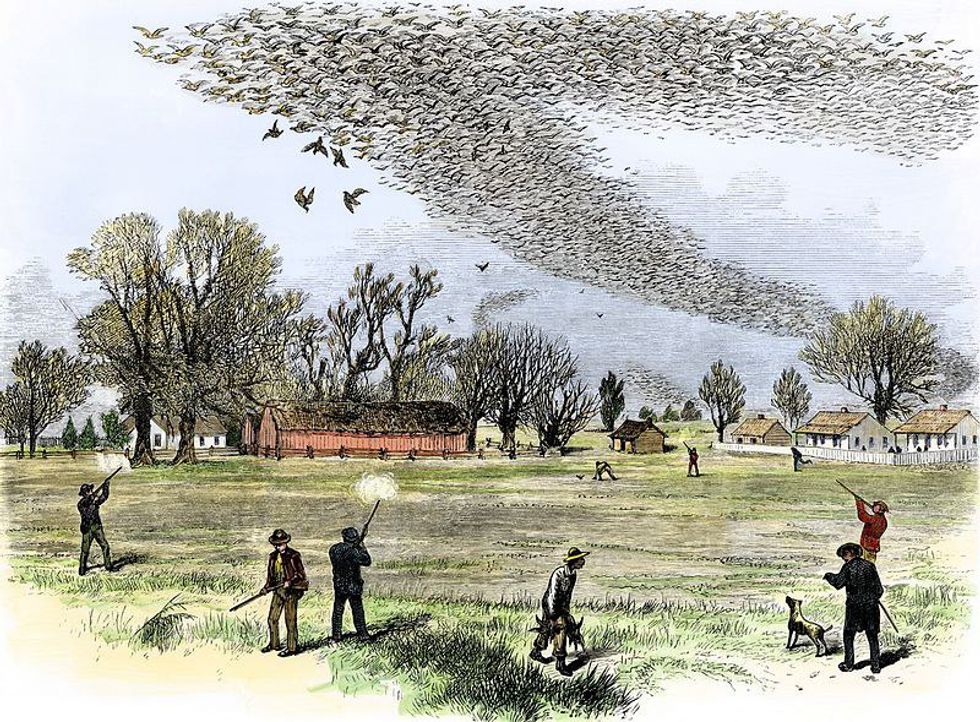Imagine being just inches away from the face of a saber tooth cat or a woolly mammoth. The very idea is mesmerizing. It would be like traveling back in time and seeing the large creatures that ruled the land of the past. Of course, these animals have been extinct for millennia which means this dream has been released to the realm of fantasy. However, efforts are underway to promote the ‘de-extinction’ of certain animals that were driven to extinction because of the efforts of the human race. Though this is true in many cases, Natural Selection states that if a specie’s genotype does not ultimately benefit the specie’s ability to thrive and adapt, the genotype will practically disappear from the gene pool and result in the elimination of those with the less effective genotype. De-extinction should not be pursued because the reintroduction of extinct species could potentially be more disruptive than helpful to the environment. The threat of disease, misunderstandings due to limited knowledge, and fast-changing environment of Earth further prove that we as humans, have a moral obligation to not revive creatures of the past.
Reintroducing species that became extinct due to human development can lead to concerns regarding all kinds of red flags about the repercussions that can result from this “de-extinction.” One major concern is disease. Not only could they bring disease to us and other existing species, but we could potentially inflict disease upon them. Mammoths, who went extinct thousands of years ago, would most certainly not survive in today’s time period. With the heightened levels of carbon dioxide in the atmosphere, along with increasing levels of methane, Earth’s current environment would not be able to cater to the needs of the wooly mammoths. Even still, there remains talk about reviving the species because it is our “moral responsibility.” If anything, we’d be doing the exact opposite of fulfilling our moral responsibility by reviving the Wooly Mammoth. With temperatures drastically rising and the shrinking polar ice caps, there is practically no permanent, viable habitat for the mammoths.
In reference to disease, the revived animals can also act as carriers for diseases that humans are susceptible to. This can result in a worldwide epidemic among humans. This factor doesn’t only affect humans, it can potentially affect other life on the planet, as well. A law professor at Stanford discussed the ethics of the de-extinction proposal. He speaks of the likely possibility of revived species becoming carriers for disease. That danger could result in the species being perceived as invasive or “pests”. There are too many points at which it can affect the food web. Not only does this affect humans, but the things we eat on a daily basis as well.
Many observers may say that reviving an entire line of extinct species is our responsibility and that we have a moral obligation to do whatever is possible to accomplish this notion of “playing God.” In conclusion, an implication of moral responsibility remains absent in this scenario. According to the Theory of Natural Selection, one species will die out if its competition proves to be more superior and advanced in the art of survival. Failure to adapt will result in death at some point. May it be by the cause of lack of physical fitness or a limit in brain capacity, natural selection has proven to explain the disappearance of many species. Humans proved to be superior to mammoths in the fight for survival, so by our hand, they died off just as natural selection describes. We also proved to be superior to the Passenger Pigeon in the fight for survival. Due to the bird’s habit in maintaining the same migration patterns throughout the entirety of its life, it failed to learn and adapt with its environment. As a result, we killed them off, just as natural selection describes.
There is speculation about how we will handle the animals post de-extinction. Will we teach them their traditional habits? Or will they develop over time through genetics and instinct? These things are completely unknown to us, thus posing a major obstacle that may be impossible to overcome. The only way these species even learned how to live their specifically designed lives was through the experience that was passed down from their ancestors. Instinct is introduced by genetics because of a specific trait that proved to be effective in survival. Such traits involve things like: reactive eye movement, migration patterns, or “fight or flight.” In order for some instincts to work, some things may need to be taught to the animals in order for the instincts to even be used in an effective way. Though the act of flying may not exactly be an instinct to a bird, the decision to fly is. When put in a situation of extreme danger, the bird will choose to fly because of the advantage it has in the air. In order for it to effectively put this to good use, the bird needs to learn how to fly initially. When it comes to extinct birds, we don’t know how their development will differ from other birds. Because of this lack of knowledge, we don’t know at which point the chicks would be able to initially attempt flying. Prior knowledge is needed in order to fulfill the so-called teaching method so the animals can learn more effectively. However, if they do learn, they are not aware of the environment of which they live in. Animals have a communication system that we are yet to understand. How are we going to be able to know that they’re effectively communicating in a way that they will stay together? When it comes to the birds’ diet, there is an insect that of which is poisonous. The Monarch Butterfly stores a poison that when ingested, is harmful to most vertebrates (birds in particular). When it comes to communication, how would birds be able to effectively tell each other the danger of ingesting a monarch? Language is something that is passed through generations. In the early stages of the newly revived bird’s life, there is likely to be much communication. Today, many birds know the danger of the monarch butterfly and know to avoid it. However, bring back an extinct bird, it may very well struggle with identifying healthy and harmful food and drive itself back into extinction. And this time it won’t be our doing, it’ll be the monarch’s.
Depiction of flock of passenger pigeons
The counter argument from the religious perspective is commonly disputed in light of the proposal of de-extinction. There is speculation that implies we will be playing God if we were to create new life. A popular response is the usual claim of God-given free will. If He gave us the ability to freely choose how we live our lives, doesn’t that give us the green light to move forward with de-extinction? The Bible specifies the purpose of the free will that was granted to us. According to a verse in the Bible, God states that one of the sole purposes of humans is to simply glorify him (Isaiah 43:7). In two different books, He also lays out the Ten Commandments, which can be used to instruct someone how to live a good, holy life. In two other instances in the Bible, God orders man to be fruitful and populate the earth (Genesis 1:29, Genesis 9:1). By no means does the Bible cite God granting us permission to become Him by creating new life.
De-extinction tests our moral obligation to act on wrongdoings done by us. There is the common argument that discusses the fact we are the cause of a species’ extinction, we should be the ones to put forth effort into bringing them back. On the contrary, all we would be doing would be creating a political safety net for anyone who wishes to simply bulldoze over a wetland or even cut down the entire Amazon Rainforest. De-extinction could give humans an easy opportunity to simply meander around policies that are put in place to help protect animals in the wild. Ultimately, de-extinction would allow us to simply shelve animal DNA as a possible back door in case a species were to go extinct. This practice would eventually lead to humans developing a dangerous habit of laziness for conservation and carelessness for the lives that dwell on the earth. We should stop focusing so much on trying to revive the creatures of the past and instead, we should be putting more effort into conserving the animals of today. If there’s anything our mothers have taught us in our lives, it’s that we shouldn’t live in the past nor should we try so hard to fix the mistakes we’ve committed. If we are to do good, we must learn from the error of our ways, to secure a healthier, more beautiful future.
The sources that assisted in this writing is as follows:
Natural selection. (n.d.). Retrieved November 30, 2016, from http://evolution.berkeley.edu/evolibrary/article/e...
The ethics of resurrecting extinct species. (n.d.). Retrieved November 30, 2016, from http://phys.org/news/2013-04-ethics-resurrecting-e...
O'Connor, M. R. (2015). Resurrection science: Conservation, de-extinction and the precarious future of wild things. New York: St. Martin's Press.





















